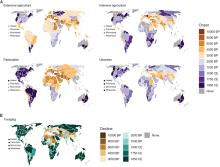Environmentally transformative human use of land accelerated with the emergence of agriculture, but the extent, trajectory, and implications of these early changes are not well understood. An empirical global assessment of land use from 10,000 years before the present (yr B.P.) to 1850 CE reveals a planet largely transformed by hunter-gatherers, farmers, and pastoralists by 3000 years ago, considerably earlier than the dates in the land-use reconstructions commonly used by Earth scientists. Synthesis of knowledge contributed by more than 250 archaeologists highlighted gaps in archaeological expertise and data quality, which peaked for 2000 yr B.P. and in traditionally studied and wealthier regions. Archaeological reconstruction of global land-use history illuminates the deep roots of Earth’s transformation and challenges the emerging Anthropocene paradigm that large-scale anthropogenic global environmental change is mostly a recent phenomenon.
Archaeological assessment reveals Earth’s early transformation through land use.
Stephens, L., Fuller, D., Boivin, N., Rick, T., Gauthier, N., Kay, A., Marwick, B., […] Ellis, E. (2019). Archaeological assessment reveals Earth’s early transformation through land use. Science, 365(6456), 897–902.
View PDF
(5.72 MB)
